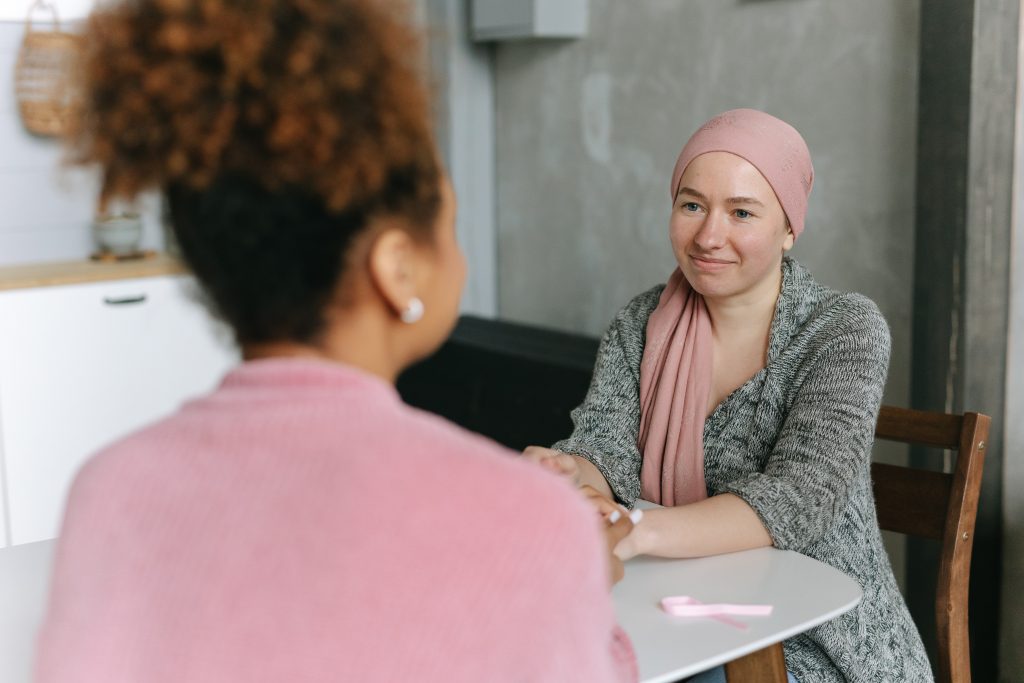How To Help A Friend With Cancer
09.07.2021

“I’ve got something to tell you. We just got back from the physician’s office, and it’s… it’s cancer. I don’t know what to do.”
Three degrees of separation. That’s all there will ever be between you and someone with cancer – at most. If you’re lucky enough not to have had it, it’s possible that one of your friends will get it, or they’ll talk to you about their time looking after someone with cancer.
And when you find out your friend or loved one has cancer, here’s the thing: It’s going to be f*cking awkward. If you talk, you might say the wrong thing. If you don’t, you’re worried they’ll think you don’t care.

Everything is about to change.
Forever.
One member of Team Vippi had a friend who was the loudmouth of the group; the social butterfly through whom all party engagements were confirmed.
Once cancer struck, they became unable to pull themselves out of a chair to leave the house. Even when they sometimes forgot about the condition due to the flow of conversation, a twinge of pain or a wave of nausea would bring them back to the realization they simply couldn’t do many of the activities they used to.
By the end, the loudmouth of the group became a bag of bones who could barely raise his voice above a whisper. What this gentleman’s friends sacrificed in being there for him was their ability to remember him solely as he was. But sacrifice is what friends are for.
As a faithful companion, there are times when you have no option but to step up – and a cancer diagnosis is one of them. Whatever you’re feeling about their diagnosis, the effects of their treatment, or even their terminal status, they will be feeling it ten times worse. Their kids and partner, even more so.
It’s time to serve as both pillar and punchbag. It won’t be easy, but the most profound and enduring friendships never are all of the time.
Team Vippi is here to help you come to terms with your role in your friend’s cancer journey.
The Shock of Discovery: Helping a friend after a cancer diagnosis
If your friend has cancer, it’s going to mean making some adjustments.
Before the sadness and panic comes the shock. Finding out you have cancer is like having a bucket of ice water dumped on your head. You’ll then experience that instant chill over and over again throughout the coming weeks as the realization continues to hit you in waves.
Emotional support

The thing is, it won’t just be the person with cancer who feels that shock – their friends (i.e., you) will also experience the gut-punch of a cancer diagnosis. You must find a way to control your shock factor. But how? This is someone you care about, after all.
The first step is to try to understand the cancer patient’s perspective. They’ll be going through a broad spectrum of negative emotions after finding out. Are they feeling embarrassed? Ashamed? Stigmatized? Weak? Helpless? Our friend feels it, and we simply have to go along with it.
Throughout all of Team Vippi’s advice in this piece, we emphasize doing the following:
- Listen.
- Be patient.
- Avoid telling them what to do.
- Do what you can to help practically.
- Repeat the previous four steps whenever you can.
There is no fixing this situation. You can’t play teacher at this time, telling them how to share their illness with society. It’s simply not your place to do so. The repercussions will hurt you both. So honor the path they want to take as a sign of your respect for their feelings.
You have to adopt a sense of patience and proceed at their pace.
Practical assistance

Unless you’re a trained oncologist, it’s best to sit this one out. Don’t give them advice. Instead, provide a shoulder to cry on and reassurance that you care and support them.
On discovering the diagnosis, maybe ask whether they need a second opinion (if you have friends who are doctors). If they agree, reach out. If they don’t, that’s where it stops. Your initiative should be to listen. Ask first, then act later, if at all.
It’s also important to arm yourself with knowledge so you can help your friend – but do not try to educate them. That’s the critical difference. Your friend has more than enough resources at their disposal. Sometimes, they just need someone around whom they can feel remotely normal with.
They don’t need to be reminded they have cancer. Avoid playing doctor at all costs.
The best cancer resources to help your friend come to terms with their diagnosis
There are many resources from major cancer institutes that you can use to learn about your friend’s condition, including:
Uphill struggle: Helping a friend while they receive treatment
Cancer treatment can, in some cases, feel worse than cancer itself. Your friend might lose their hair or a whole bunch of weight. They may feel sick, depressed, and foggy the entire time. You might forget how your friend was before they started chemo.
It’s a time of such uncertainty – more real and tangible than diagnosis, less final and inevitable than a terminal outlook. They really need you – so get into gear.
Emotional support

There’s a fine line between pity and empathy. Understanding how your friend feels is different than simply feeling sorry for them and smothering their personal space.
Every personality type handles cancer differently. And the only way to know you’re doing right by your friend is to let them lead the way.
Team Vippi’s own experiences
Two members of Team Vippi had very different experiences. Team member one had a friend with breast cancer who was extremely strong-headed before their cancer diagnosis. They didn’t feel the need to talk about it much, as they felt like they had the fortitude to face it head-on.
Team member one kept a hands-off approach, reaching out with supportive text messages and calls but having enough faith in their friend not to force support on them when it wasn’t wanted. Giving them their space and allowing them to fight their own battle was one factor that helped them heal.
However, team member two knew someone who felt very emotionally frail in the face of such a daunting task. They would regularly break down and open up about their fears and physical pain.
Team member two, however, had to serve as both pillar and punching bag. They had to deal with regular lashings out, emotional outpourings, and panic attacks from their friend without giving their perspective. That patience and reserved approach allowed their friend to be who they were, feel how they felt, and use them as a shoulder to lean on.
You know your friend and trust that they understand their own needs. Let them dictate how they want to be helped.
Practical assistance
What helps your friend right now is taking errands and obligations off their plate so they can focus on recovering from grueling bouts of chemotherapy or radiation therapy.
Your friend doesn’t need an information overload. They need all hands on deck.
There are a few straightforward things you can do to help while they’re going through their treatment.
Take over some of their chores.
Whether it’s ordering groceries online or helping around the house, they will not have the energy to attend to many of the basics you take for granted. Offer a helping hand. Walk the dog or mow the lawn.
Even go as far as making sure bills are paid and getting their kids ready for school. Whatever they need to keep their family’s affairs in motion, step up and make sure it gets done.
This also involves filling in for their primary caregiver – their partner is your friend, too. Give them a break and make everyone’s lives just a little easier at a time when that can make a huge difference.
If you’re a cook, prep some meals for a few days or order takeout for your friend’s family. Your friend may not have much of an appetite, but the family would sure appreciate the help.
Help out with treatment
They’re getting all the advice and medical interventions they can handle from their physician and oncologist, so avoid filling their head with half-guesses and “miracle cures” you found online. They need the time and space to heal from treatment at their own pace.
However, what you can do is:
- Drive them to appointments.
- Keep their medication schedule in your phone so you can remind them about meds when you’re together.
- Take them to checkups and scans.
- Be present when they come out of any surgeries or in-patient treatments.
- Take notes while you’re at appointments with them.
- Keep them motivated. This may help your friend build their strength and get through rehabilitation.
Be there for their kids
If your friend has children, make sure they’re getting to soccer practice, band rehearsals, and any playdates/sleepovers. Their lives are going to be upside down – help your friend’s kids access at least a little normality.
Thoughtful gifts
Look, your friend wants to feel as normal as possible, and being showered with gifts they might not have the energy to use may make them feel uncomfortable.
But some well-considered gift packages could bring a smile to their face while they recover from treatment.
- Send them joke gifts in the mail only you and they would get.
- Give them an “advent calendar” style setup where they can open one gift a day while they recover.
- Get them a hat and scarf to keep them warm throughout hair loss or post-chemo chills.
- Maybe they’ve got a few series they loved back in the day – Baywatch or Hawaii Five-O. Whatever it is, maybe get them a DVD box set you know they’ll love that will keep their mind occupied.
Remission: How to talk with a friend who’s received the all-clear
Take a deep breath. The doctor has said that your friend is in remission. That can mean several different things:
- They’re in partial remission, which means their symptoms are starting to clear up.
- They’re in complete remission, which means their symptoms and cancer signs have entirely vanished – for now. (It can come back.)
- They’re “cured” – which means symptoms have been in remission for at least 5 years.
Cancer is a sneaky b*stard. Your friend will want to resume normality ASAP but might take a while to regrow their hair or regain physical strength after chemo. There will be a niggling fear in the back of their head, though, about whether their cancer will come back.
Don’t rush ahead of them with optimism. False hope is crushing, and they might come to resent you if you talk about cancer like it’s in the past for good – it may not be for them.
So slowly reintroduce your friend to normality. Invite them out to restaurants. Bring your families together to hang out. Reintroduce humor and fun to their lives if these were facets of their personality that sat on the backburner
How to look after yourself while caring for a friend with cancer
You might feel sadness, anger, fear, or guilt. Your friend’s feelings are the focus, sure, but you’re a functioning human, and your feelings also matter.
You have to hold it together psychologically for both your friend’s sake and your own. Check-in with yourself; do you feel exhausted? Hungry? Just f*cking fed up?
This. Will. Drain. You. It’s hard. So whenever things get on top of you:
- Go for a walk around the block (or in nature if you have access to it).
- Take a long, hot bath.
- Phone another friend to vent or speak to your partner.
- Treat yourself to your favorite food.
- Ask your friend if you can get other friends to help, as they’ll lighten the load (don’t do it without asking).
Facing the end together: What to do if your friend finds out it’s terminal
F*ck. This is it. All of your worries, your friend’s deepest fears, their family’s horrors materialized and manifested.
Emotional support: How to have difficult conversations
There’s no point in avoiding the elephant in the room. Dreams of normality are all well and good, but empty platitudes of hope and perseverance are pretty useless now.
One of Team Vippi’s friends with cancer was at a dinner table with five other guests – their usual Tuesday night dinner out. They dropped the news that it was terminal. Another guest made an extremely ill-advised attempt to reassure the friend that “everyone dies eventually.”
They stood up, pointed at everyone around the table in turn, and said, “You’re gonna die. You’re gonna die. You’re gonna die. We’re all gonna die,” like Oprah handing out free cars to her audience. “This is just your time.” It was just about the most awkward thing Team Vippi has ever witnessed first-hand.
Don’t vent your emotions at them. They’re facing farewells with their partner and children. They’re wrestling with how to say goodbye to meaningful friendships. It hurts like hell. They shouldn’t have to comfort you. You’ll have to bite your tongue and dive right into practicalities.
Death Doula
One way to broach the difficult conversations is to get everyone’s agreement in involving the services of a Death Doula. These are health professionals who help families and patients with oncoming death in a family – death midwives, in a way. You can find your nearest end-of-life doula through the International End of Life Doula Association (INELDA).
You should be available to listen and be philosophical about finding little kernels of positivity wherever you can.
So, when they express to you that they can’t believe they’re not going to get to watch their kids grow up, there’s no point saying, “it’s going to be okay.”
Instead, tell them, “You had some amazing years with your kids, you were there for them, and you got to help them grow into truly great people.”
You might also have issues with how your friend’s partner is looking after them, but you have to keep those issues to yourself. They’ll be processing their slow-burning grief as best they can.
Practical assistance
Besides keeping up your general assistance with chores, their kids, and their general well-being, there are difficult practicalities to bear in mind.
If they’re happy to have you involved, make sure you discuss:
- Their will.
- Their funeral arrangements.
- What your friend wishes to wear in their final resting place.
- What they want to do with their ashes.
- Whether they want to write any letters to loved ones (which you can let them dictate to you on their behalf if they’re too weak to write).
- How they want significant dates like birthdays and anniversaries to be commemorated.
Possibly also make them aware of financial planning. They’ll need to know their family is in safe hands. Contact their life insurance on their behalf (with their permission), ensuring everything is in order.
However, be empathetic about the fact that planning for death is an extremely personal matter. They may not want to involve you – and that’s absolutely fine,
If they want you to help, you need to do whatever you can that allows them to focus on the emotional strain of their terminal situation.
What to avoid doing
If your friend has cancer, they’re in a sensitive place. Medication will be destroying their physicality and changing their personality. Maybe they’re facing up to their mortality. There are some things you simply have to avoid doing and saying, including:
- Don’t make the conversation about yourself. This is about your friend and their health. Your perspective, feelings, and problems will have to take the backseat. They shouldn’t have to comfort you.
- Avoid minimizing their feelings and experience. It may not be fine. Some cancers are more aggressive than others – but none of them are easy to live through. Don’t tell them they have “the good cancer.” Just listen.
- Don’t ask too many questions. Leave it at “how do you feel today?” or “what do you need?” Don’t ask about more than they’re happy to talk about. The state of their sex life post-diagnosis, for example, is none of your business.
- Don’t say things like, “ooh, you look rough today.” Like, really? A person knows how thin and frail they look after chemo. Reminding them will make them feel sh*ttier than they already do.
- Don’t bring up how other people are dealing with cancer. Even people with the same type of cancer can have wildly different experiences. Don’t play the comparison game – just listen to how they’re processing their own feelings.
- Don’t tell them how to feel. You’ve got absolutely no f*cking idea what they’re going through. Chill out. They don’t have to “stay positive” if they don’t want to.
Being there for your friend’s family
A person with terminal cancer is a ticking time bomb of enduring pain for everyone around them. It’s rarely about looking after just one person.
In the case of Team Vippi’s now-deceased social-butterfly friend, the wife they left behind found themselves being extremely jealous whenever she went over to couples’ houses, as they had something that she’d just lost. There are complex after-effects of losing someone to cancer we just don’t realize.
You have to be as robust a friend to your friend’s partner as you were to your friend. You may not feel as close – they may push you away as a memento of their partner’s presence, or their kids might see you as an intruding presence. But you have to be available and offer to help as you did when they were sick.
It’s not a matter of obligation. You should want to. It’s your way of healing, too.
The surviving family may want help scattering ashes, arranging memorials, and even starting foundations in their name. While your friend isn’t around to judge your handling of the situation after they pass, you owe it to their memory and the people they loved to step up.
That’s a true friend – one who is there when the person they miss can’t be.
The roundup
Whatever advice we give, it’ll never be easy. You’ll think about your friend every day after their passing. Even in non-terminal cases of cancer, the sheer effort of getting through it will change your friendship forever – hopefully for the better.
Being empathetic and a good listener can make all the difference.
You can be one of the key factors in your friend’s life that gives them strength and drive.
Article resources
Banner, V. (2014). 10 tips for supporting a friend with cancer. https://www.mskcc.org/news/10-tips-supporting-friend
How to be a friend to someone with cancer. (2016). https://www.cancer.org/treatment/caregivers/how-to-be-a-friend-to-someone-with-cancer.html
Supporting a friend who has cancer. (2018). https://www.cancer.net/coping-with-cancer/talking-with-family-and-friends/supporting-friend-who-has-cancer
The best (and worst) ways to support a friend with cancer). (n.d.). https://www.nm.org/healthbeat/healthy-tips/the-best-and-worst-ways-to-support-a-friend-with-cancer
What to say to someone who has cancer. (2019). https://www.macmillan.org.uk/cancer-information-and-support/supporting-someone/emotional-support-for-family-and-friends/what-to-say-to-someone-who-has-cancer
Your feelings when someone has cancer. (2019). https://www.macmillan.org.uk/cancer-information-and-support/supporting-someone/emotional-support-for-family-and-friends/your-feelings-when-someone-has-cancer
When someone you love has cancer. (2014). https://www.cancer.gov/publications/patient-education/when-someone-you-love-has-advanced-cancer.pdf
Nathan-Garner, L. (2018). 19 ways to help someone during cancer treatment. https://www.mdanderson.org/cancerwise/19-ways-to-help-someone-during-cancer-treatment.h00-159223356.html
Cancer etiquette. (n.d.). https://www.cancercenter.com/community/for-caregivers/cancer-etiquette
Caring for the carer when someone is dying. (n.d.). https://www.cancerresearchuk.org/about-cancer/coping/dying-with-cancer/caring-for-the-carer
Understanding cancer prognosis. (2019). https://www.cancer.gov/about-cancer/diagnosis-staging/prognosis















